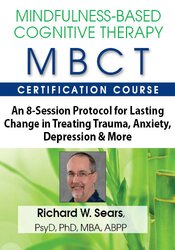

CBT has a long history of helping clients break free from negative thoughts. But have you ever found that the more you challenge your client’s thoughts, the worse they get?
The evidence for using mindfulness is also exploding in the clinical research literature. Unfortunately, if used to help clients temporarily feel better, you might be reinforcing avoidance of their thoughts and feelings, making them worse in the long run!
I am often asked how CBT and mindfulness can work together. After all, CBT is all about change, and mindfulness emphasizes acceptance of reality in this moment. The answer is simple: we must accept reality as it is in order to effectively build a life worth living.
With Mindfulness-Based Cognitive Therapy (MBCT), you get the best of both CBT and mindfulness. MBCT is an empirically-validated intervention with decades of research support. The 8 sessions of the formal MBCT protocol is a “boot camp” for clients and clinicians to systematically learn and experience the subtle and sophisticated principles of mindfulness and CBT. The principles can also be easily incorporated into other therapy modalities to synergize the effectiveness of what you are already doing.
However, you cannot leverage the power of these techniques just by reading about them. To provide these interventions effectively for clients, it is imperative to experience it for yourself. Learn from psychologist and expert mindfulness trainer Dr. Richard Sears for a two-day experiential MBCT recorded workshop. You will experience every mindfulness exercise, CBT principle, and didactic component of the entire program, along with tips for adapting the material into a variety of individual therapy settings.
As an added bonus, programs like MBCT have also been shown to reduce stress and burnout for clinicians! And, when clinicians practice mindfulness for themselves, their clients have better outcomes!
| File type | File name | Number of pages | |
|---|---|---|---|
| Manual - 2-Day Experiential Course (5.9 MB) | 79 Pages | Available after Purchase |

Richard Sears, PsyD, PhD, MBA, ABPP, is a licensed psychologist in Cincinnati, Ohio, board certified in clinical psychology by the American Board of Professional Psychology (ABPP), runs a private psychology and consultation practice, and is the director of the Center for Clinical Mindfulness & Meditation. He has run hundreds of mindfulness groups and was lead clinician in the first brain scan study involving mindfulness with children and adolescents. He is also an adjunct professor in the University of Cincinnati psychology department, clinical research faculty at the UC Center for Integrative Health and Wellness, volunteer professor of psychiatry & behavioral neurosciences at the UC College of Medicine, and a former research/psychologist contractor with the Cincinnati VA Medical Center.
His most recent books include ACT with Anxiety (PESI); The ACT Flip Chart (PESI); Cognitive Behavioral Therapy & Mindfulness Toolbox (PESI); Mindfulness: Living Through Challenges and Enriching Your Life in the Moment (Wiley-Blackwell); Building Competence in Mindfulness-Based Cognitive Therapy (Routledge); and Mindfulness-Based Cognitive Therapy for PTSD (Wiley-Blackwell).
Dr. Sears is a sixth-degree black belt in Ninjutsu, and once served as a personal protection agent for the Dalai Lama with his teacher, Stephen K. Hayes. He has studied Eastern Wisdom for over 40 years, receiving ordination in three traditions, and transmission as a Zen master.
Speaker Disclosures:
Financial: Dr. Richard Sears maintains a private practice and has employment relationships with the University of Cincinnati College of Medicine, the University of Cincinnati for Integrative Health and Wellness, Alliance Integrative Medicine, and Wright State University School of Professional Psychology. He receives compensation as a consultant and royalties as a published author. Dr. Sears receives a speaking honorarium, recording, and book royalties from PESI, Inc. He has no relevant financial relationships with ineligible organizations.
Non-financial: Dr. Richard Sears is a member of the Association for Contextual Behavioral Science, a diplomate of the American board of Professional Psychology, and a fellow with the Academy of the American Board of Clinical Psychology. He is a peer reviewer for Mindfulness and a book reviewer for John Wiley & Sons, Inc, and Routledge. He is the director of Center for Clinical Mindfulness and Meditation.
|
Mindfulness-Based Cognitive Therapy (MBCT): An 8-Session Protocol for Lasting Change in Treating Trauma, Anxiety, Depression & More
Copyright: 20/08/2025 - Product Code POS055540 |
Foundations & Principles of MBCT
Core Techniques of MBCT
STEP-BY-STEP GUIDED EXERCISES FOLLOWED BY MINDFUL INQUIRY
The 8 Session MBCT Curriculum
How to Develop Awareness
How to Be Present with Our Experiences
How to Make Skillful Choices
MBCT-Based Interventions for:
Trauma
Anxiety
Chronic Pain
Stress
Depression
Children & Adolescents
Please wait ...